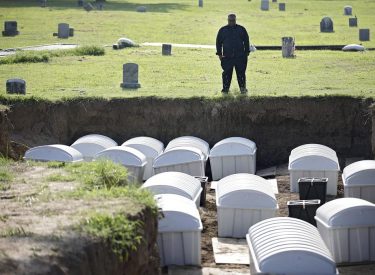Utah Lab Working On Tulsa Race Massacre Investigation Says People Are Turning In DNA, Family History
News 6 - September 15, 2022 5:52 am

Tulsa Race Massacre coffins found in early 2022.
TULSA, Okla. –
The Utah lab working on the Tulsa Race Massacre graves investigation said people are starting to turn in information and DNA.
People sharing that information are hopeful they could be a match with the remains found in a mass grave at Oaklawn Cemetery last summer.
Intermountain Forensics said it has received dozens of submissions, of family stories and family trees.
The genealogy team said about 70 percent of people sharing information have already taken a consumer DNA test, through places like Ancestry.com or “23 and Me.”
Intermountain Forensics Genealogy Case Manager Alison Wilde said many of those people have uploaded their information to the databases the lab will be using going forward, which she said is “fantastic.”
So far, Intermountain Forensics said it only has two samples from the remains found at Oaklawn last summer, that it feels confident about trying to find matches with. Archeologists said they sent remains to the lab from 14 individuals found at Oaklawn.
Archeologists plan to go back to Oaklawn for more excavation work this fall, with the goal to collect more DNA samples.
The group “Justice for Greenwood” held a meeting last month urging people not to donate their DNA for this effort, saying it would be available for the public and law enforcement to search.
Wilde shared a document at Tuesday’s Public Oversight Committee meeting, showing several different paths for sharing information and DNA.
“It’s true that DNA is a necessary part of this project, it is the only way these remains will be identified. At the same time, only community members comfortable with DNA testing should participate in that aspect of this project,” Wilde said.
A member of the Public Oversight Committee, Greg Robinson, expressed frustration at the meeting, and pushed for future meetings to be held in person, with an option to watch virtually. He argued holding in person meetings would keep the community more aware and involved.
For more information about the lab doing the work, click here.



